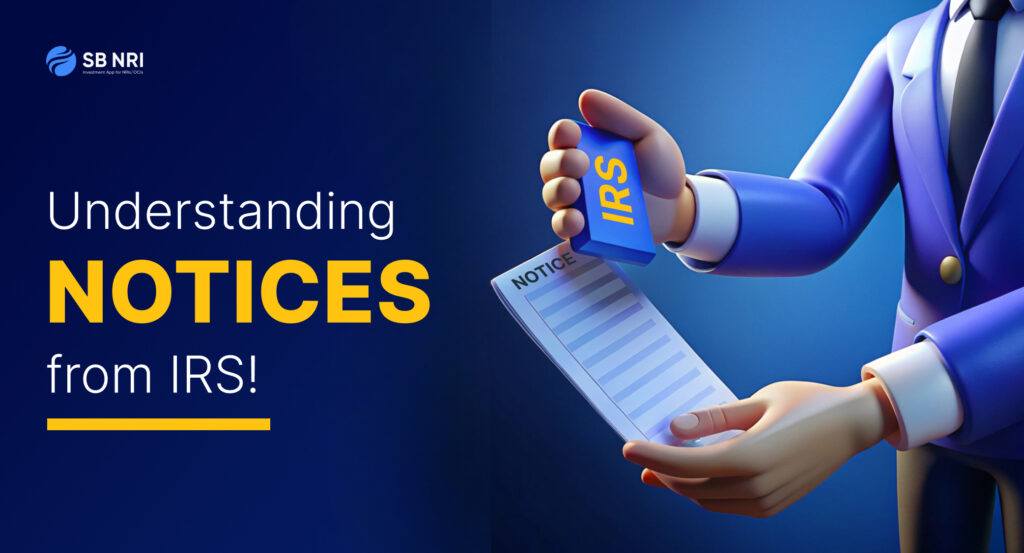
Receiving a notice from the Internal Revenue Service (IRS) can be unsettling, but it’s important to remember that not all notices indicate a problem. Often, these communications are routine, aimed to resolve any issues or provide updates on your taxes.
For NRIs living in the US, understanding the purpose and content of IRS, and providing an appropriate response to IRS notices is important. This guide simplifies the process, ensuring you can address any notice with confidence.
Why the IRS Sends Notices
The IRS sends notices for a variety of reasons, including:
- Filing Updates: To confirm receipt of your tax return or inform you of corrections.
- Balance Information: To notify you of underpaid or overpaid taxes.
- Verification Requests: To seek additional documentation or verify your identity.
- Audit Notifications: To inform you about an audit of your tax return.
- Account Adjustments: To report changes made to your account.
- Payment Reminders: To remind you of due payments or upcoming deadlines.
Each notice includes a unique code or number, helping you identify its purpose.
Key Sections of an IRS Notice
Understanding the structure of an IRS notice can make it easier to address:
- Notice Number: Found at the top right corner, this number identifies the type of notice.
- Reason for Notice: A brief explanation of why the notice was issued.
- Requested Action: Specific steps you need to take, such as providing additional information or making a payment.
- Deadline: The timeframe within which you must respond or act.
- Contact Information: Details of how to reach the IRS for questions or assistance.
Common IRS Notices and Their Meanings
Here are some frequently encountered IRS notices:
- CP12: Indicates a correction to your tax return, often resulting in a refund or adjusted tax liability.
- CP14: A reminder that you owe taxes.
- CP90: Notification of an intent to levy (seize assets) due to unpaid taxes.
- CP2000: Suggests a mismatch between the income reported on your return and what third parties reported to the IRS.
- Letter 4883C: Requests identity verification to prevent fraud.
- Letter 5071C: Requests verification of identity if the IRS suspects your return might be fraudulent.
Steps to Take Upon Receiving an IRS Notice
1. Don’t Panic
Receiving a notice doesn’t automatically mean you’re in trouble. Many notices are routine and easily resolved.
2. Review the Notice Thoroughly
- Read every section carefully to understand its purpose.
- Note the notice number and the requested action.
3. Verify Its Authenticity
IRS notices are typically sent by mail. Be cautious of emails or phone calls claiming to be from the IRS, as these could be scams. Visit the official IRS website or call their contact number to confirm authenticity.
4. Assess Your Response
- If the Notice is Correct: Follow the instructions provided. This may involve making a payment or submitting additional documents.
- If the Notice is Incorrect: Gather evidence to dispute the claim, such as tax returns, payment receipts, or supporting documents.
5. Respond Promptly
Timely responses are critical to avoid penalties or escalations. Use the address or contact information provided in the notice for a response.
6. Seek Professional Assistance
If you’re unsure how to respond, consult a tax professional or accountant, especially if the notice involves complex issues like audits or large tax liabilities.
Tips for NRIs Dealing with IRS Notices
- Keep Records Organized: Maintain copies of all tax returns, receipts, and correspondence with the IRS.
- Understand Tax Treaties: Familiarize yourself with the Double Taxation Avoidance Agreement (DTAA) between India and the US to avoid dual taxation.
- File Accurately: Ensure your tax returns are accurate and complete to minimize errors and discrepancies.
- Update Contact Information: Inform the IRS of any changes to your address or contact details.
- Monitor Deadlines: Respond within the time frame specified to avoid penalties.
Conclusion
Receiving an IRS notice as an NRI doesn’t have to be stressful. By understanding the purpose and content of the notice and taking prompt, informed actions, you can resolve most issues efficiently. Staying organized, filing accurate tax returns, and seeking professional guidance when needed are key to managing your US tax responsibilities seamlessly.
Whether it’s a routine update or a call for action, addressing IRS notices with care ensures compliance and peace of mind in your financial journey. Chat with CPA to resolve all your notices and prevent future IRS notices!
SBNRI is an authorized Mutual Fund Distributor platform & registered with the Association of Mutual Funds in India (AMFI). ARN No. 246671. NRIs willing to invest in mutual funds in India can download the SBNRI App to choose from 2,000+ mutual fund schemes or can connect with the SBNRI wealth team to better understand Mutual Fund investments.
Disclaimer: This blog has been written exclusively for educational purposes. The securities mentioned are only examples and not recommendations. It is based on several secondary sources on the internet and is subject to changes. Please consult an expert before making related decisions. SBNRI does not intend to predict future returns, please read all related documents before investing.
Frequently Asked Questions
Why did I receive an IRS notice?
The IRS sends notices for various reasons, such as correcting errors on your return, requesting additional information, or notifying you of tax payments due.
What should I do if I disagree with the notice?
If you believe the notice is incorrect, provide supporting documents and a written explanation to dispute it. Consider seeking help from a tax professional.
Can I ignore an IRS notice?
No, ignoring an IRS notice can lead to penalties, interest, or escalated actions like asset seizure.



